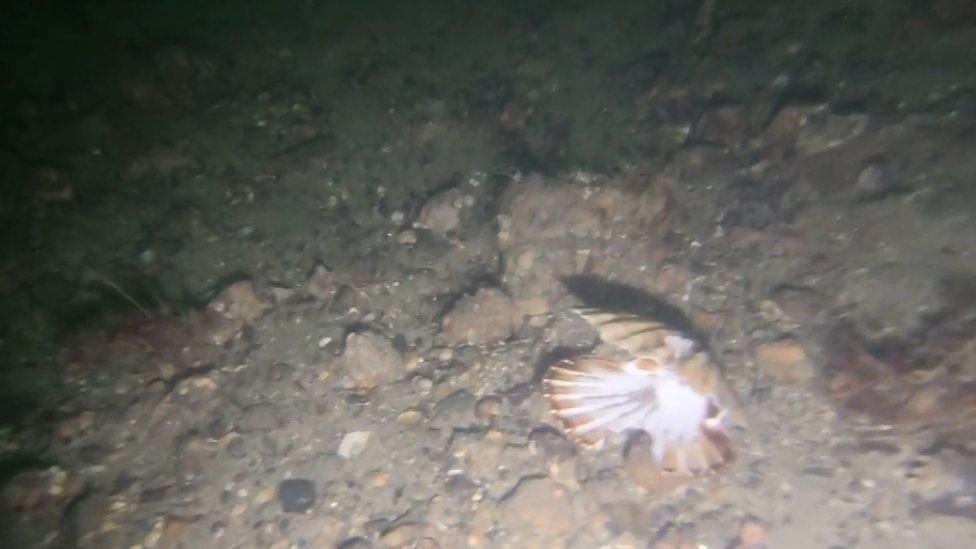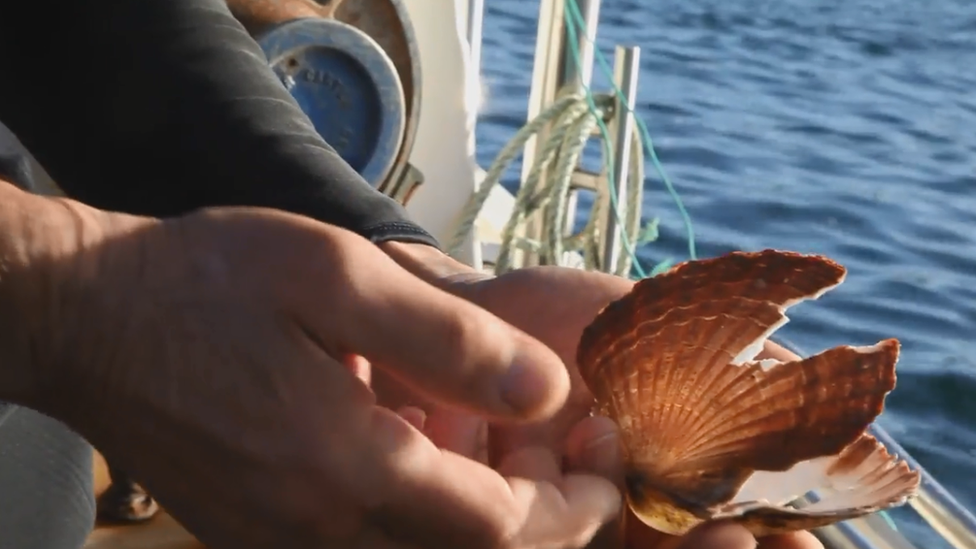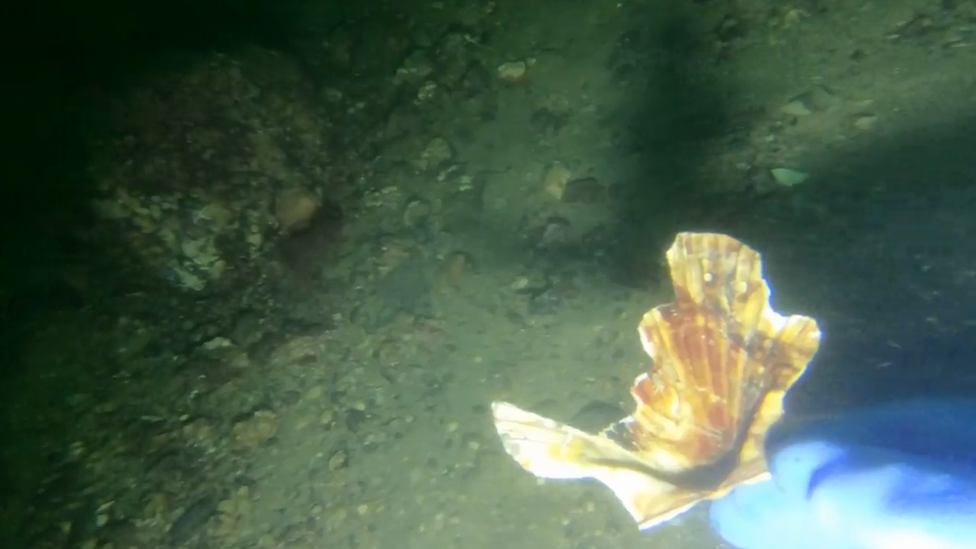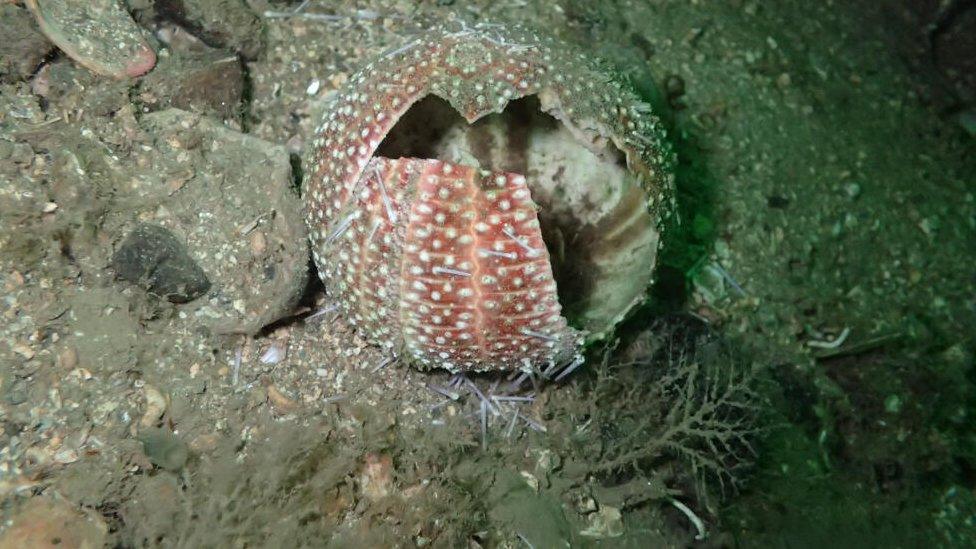Divers uncover Firth of Lorn 'illegal scallop dredging'
- Published
Divers uncover evidence of illegal scallop dredging.
A team of divers say they have uncovered evidence of illegal scallop dredging in a protected area on the west coast of Scotland.
Broken shells, dislodged boulders and fresh scallop meat were all filmed on the seabed in the Firth of Lorn.
Environmental group Open Seas said it showed that Marine Protected Areas, external (MPAs), where fishing with gear is banned, are not effectively policed.
The discovery follows damage to a rare reef in Loch Carron last year.
It led to an emergency closure of the waters.
Steve Barlow and Davy Stinson discovered the aftermath of dredging on a recent dive near Insh island and returned with camera equipment.
Mr Barlow said: "I could see lines on the seabed which is classic of the dredges. This is where they dredge spikes along the sea bed.
"Then I was seeing boulders and broken scallop shells and scallops with meat still in them. So it was very recently that it happened."

Broken scallop shells were found on the seabed
By the second dive, the dredging lines had been churned up by currents but marine damage was still present.
He added: "It's 100% definitely damage caused by the sword from the scallop dredging.
"It's a Marine Protected Area which had historically been very heavily dredged. When the protection came in, it started to recover and the environment was rebuilding itself."
Dredgers catch scallops by dragging heavy equipment along the seabed.
They are banned from operating in certain areas to protect marine features. But divers, who catch the scallops by hand, are allowed to operate.
An MPA to protect the common skate population was introduced in 2014 from Loch Sunart to the Sound of Jura.
The divers believe dredging is "common" with boats operating without location-tracking equipment and possibly at night.

Campaigners say the evidence proves Marine Protected Areas are not effective
Marine Scotland Compliance has been informed of the damage.
Nick Underdown, from Open Seas, said: "It's a tragic situation. If this seabed was left alone it would recover, but instead we have got illegal dredging going on. This is not an isolated incident.
"It's a crime. There are vessels out there which are illegally dredging inside Marine Protected Areas and they are selling those scallops into the supply chain.
"The Scottish government have got to get on top of this situation."
In April 2017, damage was caused to a rare flame shell reef in Loch Carron by a dredger which was operating legally.
But the incident caused such outrage that the Scottish government's environment secretary Roseanna Cunningham ordered the immediate closure of the fishing grounds.

Debris was spotted near Insh island
The Scottish government confirmed the Open Seas divers' latest claims were being investigated.
A spokesman said: "We have received recent reports of suspected illegal dredging in the area. Marine Scotland Compliance are actively investigating the activities of a number of suspect vessels.
"Compliance officers of Marine Scotland are keen to work with local groups to help them fully understand the regulations surrounding particular Marine Protected Areas and properly document any suspicious activity they might come across.
"Marine Scotland invests significant resource into regular boat patrols, as well as the presence of one of its Marine Protection Vessels in the area to ensure compliance. The risk of breaches of regulations are considered regularly and further resources tasked to the areas of highest perceived risk."
The Scottish Fishermen's Federation, which represents some dredger owners, has condemned the dredging.
Chief executive Bertie Armstrong said: "The Scottish Fishermen's Federation distances itself from any illegal activity in MPAs, or elsewhere.
"We understand that Marine Scotland has been made aware of any evidence gathered and we await the outcome."
- Published24 April 2017
